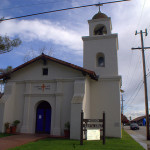I was surprised to learn that some people perceive, and maybe there actually are, “destination districts” in The Wesleyan Church. I had no idea such a concept existed, and perhaps that is because I am currently in one of the destination districts. I knew that I work under an effective and well-liked district superintendent, and that California is one of the states that many people dream of living in at some point in their lives, but I never considered ranking my district’s desirability above or below another district. Perhaps I am naive spending time in prayer and looking for a local church that can use my gifting.
Living here, I see the good (diversity, climate, geography) and the bad (high cost of living, taxes, poor economy) of California, and see it as just one of many places where I could engage in ministry. As I spent the spring and summer months networking, I never considered a district’s cachet of leadership, geography and church growth. I based my choice of districts on (not list in order of importance, and my previous statement of prayer and gifting are assumed):
- Are there open pastoral positions?
- Do I have any contacts in the district?
- Do I have relatives nearby or is there a airport nearby?
- Is there employment for teachers?
- What are the local demographics?
The fact remains that just as some churches are larger and have more resources than others, so also districts are uneven. Over the last two years, I have noticed larger Wesleyan churches or networks actively resourcing and providing training for others. Examples include: SoulShift from College Wesleyan Church, The Techology Show, the John C. Maxwell Leadership Center being put together by 12Stone, and pastor writers such as Mark Wilson (Filled Up Poured Out). My church is not huge, but last year we commissioned our youth pastor to go help with a church restart in another city. Local churches are breaking down the silos. I know our district superintendents talk to each other, but, other than sending each other candidate names, do they resource each other? I do not know the answer to that, but I have the impression that districts rise and fall on their own.
My questions are:
- Have our districts become silos that inhibit us from resourcing one another?
- Are there ways districts can share resources (and I mean anything from money to ministers)?
©2012 Paul Tillman







